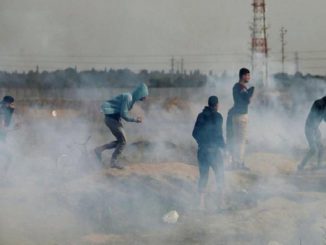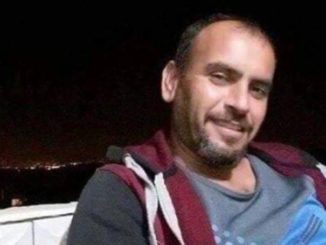
By Ramona Wadi
At the G7 summit in Paris, US President Donald Trump speculated publically about the purported “deal of the century”, which infuriated the Palestine Liberation Organisation (PLO). If one had to rely on the PLO’s statements, though, it would seem as if there were no precedents that permitted Trump to support overtly Israel’s colonization of Palestine.
Indeed, Trump’s rhetoric revealed nothing new. He surmised that Palestinians and Israel want the deal as they are “tired of fighting” and gloated over the US decision to cut funding from the Palestinian Authority and organizations which help Palestinian refugees. The only diversion was reneging on previous admissions that the so-called peace plan might be revealed before the Israeli General Election next month.
For the PLO, Trump’s remarks provided an opportunity to revel in an anti-colonial stance not backed up by action. Singling out the Trump administration for violations which have been fomenting for decades is harming Palestinian prospects. Trump has exacerbated what the international community started in terms of divesting Palestinians of their political rights to depict them solely as a humanitarian issue.
PLO Executive Committee member Hanan Ashrawi’s criticisms are valid. Trump has indeed restricted Palestinian options through a series of unilateral decisions which continue to deplete Palestine. Her assessment is that the manipulation of humanitarian aid “as a coercive tool” and the US State Department’s elimination of Palestine from its Middle East agenda are indeed forms of erasure.
Yet Ashrawi persists in glorifying the international community as the only viable option for Palestinian rights. “Palestine will continue to work with responsible international partners who share our commitment to the international rules-based order and recognize the Palestinian people’s inalienable rights to self-determination and freedom,” she asserted.
The international community’s approval of the Oslo Accords and the PLO’s acceptance of the terms which rendered Palestinians as a perpetual humanitarian project are factors which do not feature in Ashrawi’s remarks. How far will the international community object to the US plans to increase dependency on humanitarian aid when it has incentivized the entire world to such a perception of the Palestinians? This begs another question: why does the PLO validate a collective entity’s designation of Palestinians as humanitarian aid recipients and repeatedly asserts itself willing to work with such entities?
Constructing an image of the US under Trump as an isolated and dangerous entity is misleading. Turning to the international community as a viable option to oppose Trump’s plan, when international consensus is against Palestinian emancipation even from the humanitarian situation that the people find themselves in, is more than enough indication of the PLO seeking its own survival through its diplomatic role. Without political actors to substantiate its relevance, the PLO has lost all validity.
The international community’s gradual failing of Palestinians is in line with what Trump wants to achieve; the only difference is that the former embarked upon a process of normalizing Israel’s colonial violence while mapping out a peace façade that has cost lots of Palestinian land and lives. If the PLO, as indicated by Ashrawi and many other members on different occasions, continues to pledge allegiance to the international community before Palestinians and their legitimate demands, then it must clarify its role as an enabler of the inhumane, humanitarian diplomacy that has gambled with Palestinian lives, land and memory.
– Ramona Wadi is a staff writer for Middle East Monitor, where this article was originally published. She contributed this article to the Palestine Chronicle.







